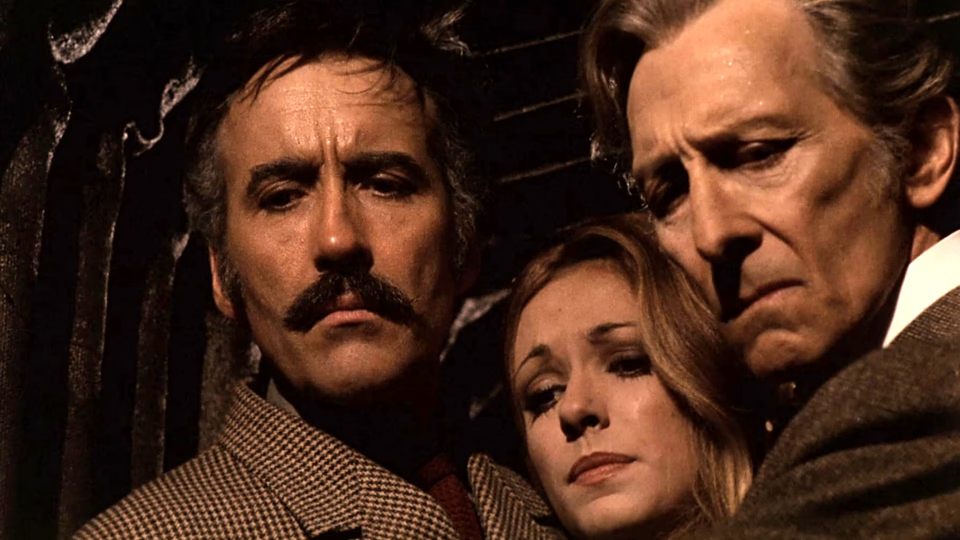Horror Express

Horror Express may be flawed, but the production, performances, and novelty of genre icons Peter Cushing and Christopher Lee working as allies make it hard to resist.
Set aboard the Trans-Siberian Express at the turn of the twentieth century, Christopher Lee plays an anthropologist transporting a frozen fossil he believes might be the missing link. Peter Cushing plays a rival anthropologist aboard the same train who’s itching to get a look at Lee’s discovery. His machinations free the beast inside who can jump from host to host by staring into a victim’s eyes.
It’s a pseudo-remake of The Thing from Another World. One that lacks any sense of paranoia. We always know the monster’s identity, robbing the story of any mystery or tension. Compare it to John Carptenter’s superior The Thing from Another World remake. In Carpenter’s version, we never know who’s the monster until they reveal themselves—to our horrific surprise—by claiming a victim. Thus every scene crackles with suspense because anyone could be the killer. The growing animosity and distrust between the victims proves just as horrific as the monster.
Despite this fatal flaw, Horror Express entertains. Lee and Cushing bring their considerable screen presence, and despite their many collaborations, this proves one of the few films that teamed them as heroes. Top-billed Lee takes the less-flashy role, a stuffy bureaucrat to Cushing’s savvy operator. Cushing even gets the film’s best line. When he and Lee pair up to track down the creature, someone asks, “But what if one of you is the monster?” to which, Cushing replies with astonishment, “Monster? We’re British, you know!” It’s a laugh-out-loud moment that winks at the audience, acknowledging the film’s inanity.
This proves even more poignant considering Cushing was still mourning his wife’s death earlier that year. He considered quitting the production, but Lee persuaded him to stay, convinced working would help him through his grief. Ever the professional, you’d never suspect Cushing’s melancholia given his and Lee’s spirited on-screen rapport.
The production values also shine. The Spanish exteriors lend an old-world sheen, and the train sets feel authentic, crafting a claustrophobic atmosphere. When the horror elements kick-in, the gruesome practical effects deliver. An early highlight comes with Cushing performing a bloody autopsy sequence that sees him extract a victim’s brain. And I loved the white-eye effect the creature leaves on its victims.
Capping it off, Telly Savalas shows up in late in the proceedings playing a Russian Cossack. He doesn’t even try to affect a Russian accent and plays his part with a cocky arrogance that can’t help but charm. It’s a welcome dose of ridiculousness just as the film was dragging and provides a third lead capable of carrying the film when Lee and Cushing are off screen.
Given the cast and production, Horror Express should have been great. Embracing the premise’s inherit paranoia would have gone a long way. But for fans of Lee and Cushing’s Hammer Horror fare, this should prove a pleasing enough diversion, on par with the studio’s later output. Not worth seeking out, but worth a look should the opportunity arise.